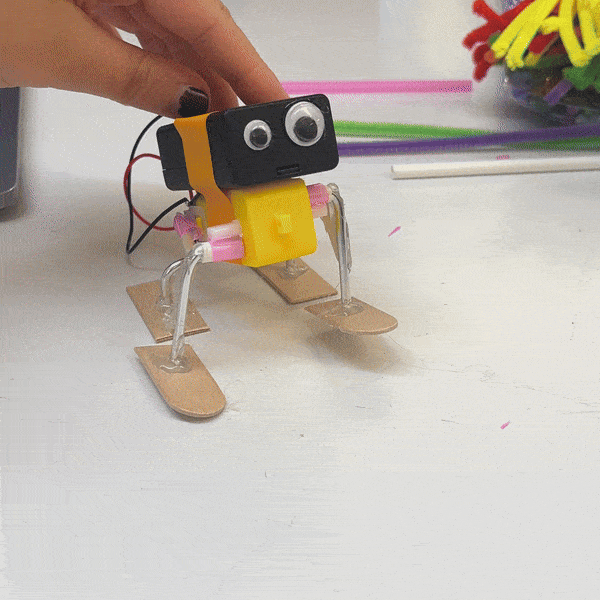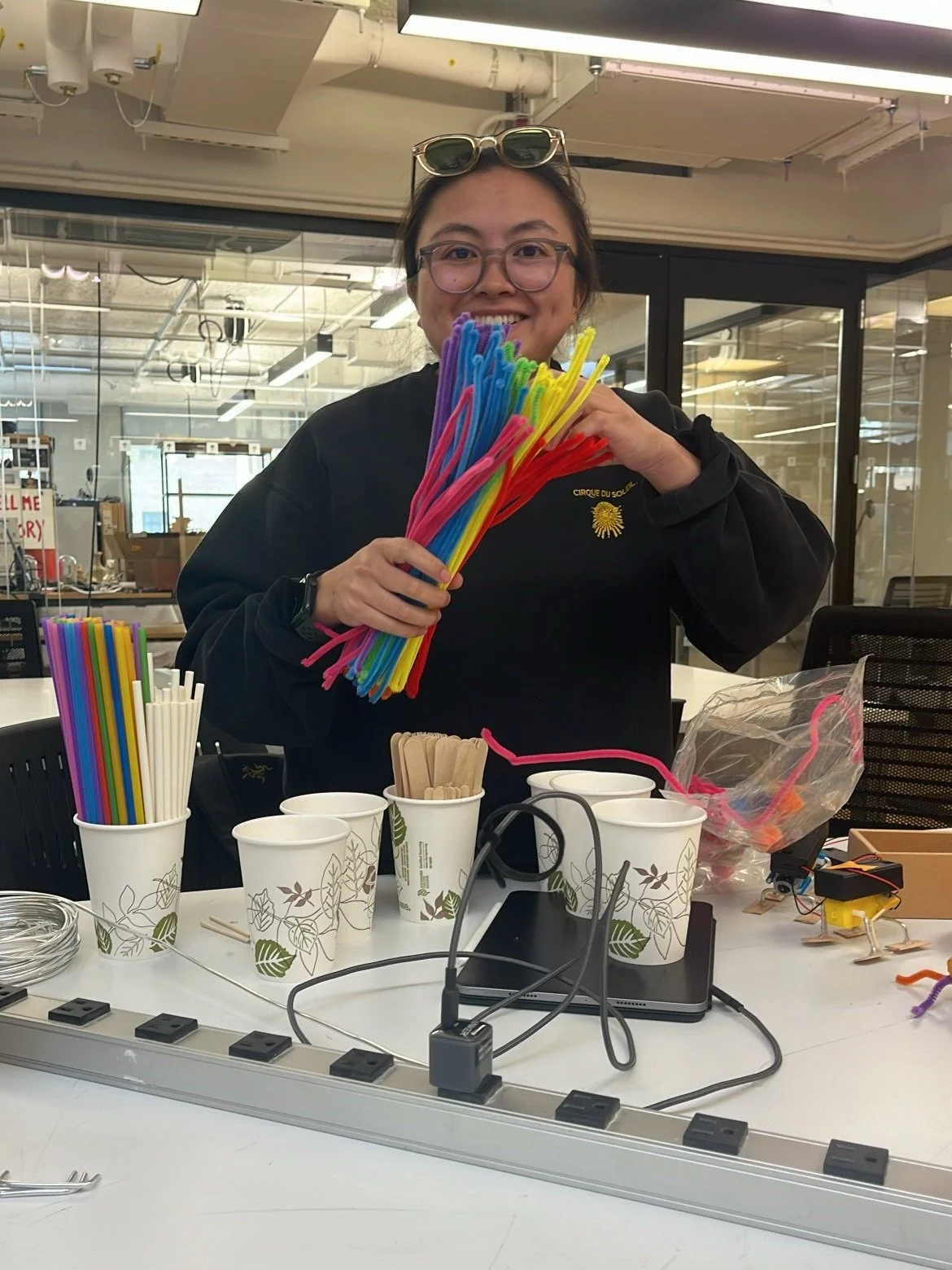During my time in grad school I dabbled in teaching. At ITP there were opportunities to work as a teaching assistant for undergraduate classes in Interactive Media Arts (IMA) program. My first semester I helped out with Yeseul Song’s physical computing class: hosting office hours, evaluating assignments, and preparing class/lecture materials. What was most fun for me was getting to know the students and mentoring them through project development. Through assisting other classes and developing extracurricular workshops I wonder if I would want to be a teacher some day.
Here are some highlights from the workshops I facilitated during my time in school. I really enjoy collaborating with my friends on conceptualizing the workshops, writing the curriculum, and assembling materials. It is a rewarding process to be able to synthesize concepts into a lesson or activity and be able to share it with others. I’ve had many great teachers in the past who have cleared up ideas that I thought I would never grasp by explaining them in a more approachable way, so I’ve tried to keep accessibility a top priority in most of what I do. I also cherish hands-on learning for teaching technical ideas.
These workshops were a lot like community service work. Many times, we saw a need in our community and took on the task of creating an opportunity for learning. And boy, did I learn a lot!
Dragtronics
Wearable electronics for drag with Kay Wasil, September 17, 2023
Two summers ago, my friend Kay approached me about helping them design a workshop for beginners wanting to get started with wearable electronics. Kay is a super talented drag performer, costume designer, show producer, and has a bunch of technical chops of their own! They regularly work with other performers to make interactive or technological looks👀. We worked together to create Dragtronics, a free, one-day, hands-on workshop for wearable electronics for drag.
To make participation more fair we put out an open call to Kay’s community prioritizing low-income and communities underrepresented in the NY drag scene. We convinced our department to let us host our workshop at school on the weekend and use some electronics workshop resources. We were also donated 20 Adafruit Circuit Playground Express’s by our friends at Bodies in Play and OCAD’s Social Body Lab which helped us keep this workshop free (thanks Kate Hartman!☺️).
Participants trying out Kay’s bubble crayon
Kay leading the brainstorming session
We centered the curriculum the Circuit Playground because it is a great microcontroller to get started with hardware. It comes with many built in sensors, has connection points that are easy to sew to, and can be programmed using visual programming through MakeCode which is great for beginner coders.
We wanted this workshop to be an overarching sample of whats possible in the world of wearables and drag. We hoped to build skills that participants could take home with them to apply to their future costumes. We emphasized the value of open source hardware and hoped they might takeaway the skills to continue learning on their own or even share some of what they learned with their friends.
This was my first workshop and it is my favorite. I think Kay and I just work really well together and there was a lot of community interest so we’ve talked about hosting it again in the future🤞🏽. One update for the future is definitely sending out a pre- and/or post- survey so we can tailor the workshop to what’s most interesting to performers and also get a sense of how much of the physical computing ideas people were able to take home with them.
For more information, you can check out the presentation we made for Dragtronics.
Beep Beep Booper
Building a lil analog piano circuit with Bianca Gan and Gracy Whelihan, July 24, 2024
Beep beep booper piano
I helped design this workshop with my friends Bianca and Gracy this summer for high school students participating in the College Career Lab program. This workshop happened over two days at ITP. The idea to build this analog piano circuit was inspired by this tutorial from elonics. We prepped for the workshop by making kits: cutting wires, soldering leads, and laser cutting the custom enclosures, ahead of time so that the workshop was plug and play. We had lots of new things to cover in a few hours!
Soldered LED bouquet
Prepped kit
Demo circuit
The workshop curriculum covered basic electronic components. We prepared a step-by-step Lego-esque guide to build the circuit. Day two of the workshop, we talked a bit about the laser cutter and were able to laser cut some student designs. We helped students mount their components in their box enclosures and there was leftover time to customize the piano boxes with markers.
Overall, I think this was a super successful workshop. Though we weren’t expecting students to fully understand how the circuit works, everyone went home with a working piano! Not to be dramatic, but I do think this early on exposure to electronic components and how circuits are made can potentially alter a students future. And I think the students had fun! You can hear it in this video —>
For more details, you can find a copy of our presentation here.
DIY Robots
with Bianca Gan and Gracy Whelihan, July 12, 2024
This was a workshop I helped with for a group of high school students participating in a summer program called GSTEM. We planned to make these two crafty little motorized robot designs with two back-to-back groups of ~15 girls. Before workshop day, we tested the robot designs we found online and prepped as many materials as possible: soldered tiny motors to battery packs, cut popsicle sticks and straws, and bent wires.
On workshop day we transformed the ITP conference room into a robot factory. We put down a bunch of butcher paper, plugged in glue guns, distributed pipe cleaners, scissors, straws, and motors. We presented our slide show and all three of us ran around the room to helping students build.
Bianca sorting our materials
Gracy prepping the room
This workshop proved to be a bit challenging. Overall, I think we were grateful to be working in a group to prep and facilitate this workshop. We didn’t have time to delve into technical concepts but I think it is important for kids, especially girls, to see that robots can take many forms and complex mechanisms can be made from simple, everyday materials. Some students seemed to find this process a bit frustrating. The build required crafty approximations and thinking outside the box. Everyone left with a working mini toothbrush robot but not everyone completed the walking robot build. Some students even left their walking robots behind🥺
Overall, I think this was a fun and crafty workshop, great for kids, but leaving more time for explanation and building is crucial. You can find a copy of our presentation here.
Graveyard of abandoned robots
Stupid Arduino
for Blinkers with Jess Shen, February 24, 2024
This was… ambitious: a 50 minute crash course in Arduino for a “Stupid Hackathon” I helped organize. Jess and I are some of the few electrical engineers in our cohort, but this was still a tough task. There was not much curriculum designed for this workshop. The goal was to get people’s hands on an Arduino and build a DC motor circuit so that they could use it in their hacks. We kind of threw participants into the deep end (by design!) however everyone came away with a turning motor! Yahoo!
For this workshop we prepped some Arduino example code and gathered hardware kits (breadboard, Arduino, motor, motor driver, buttons, USB cables, and wires). During the workshop we went around and debugged circuits. One crucial learning curve for us, workshop facilitators, is to hand out USB cables (power) only after checking circuit wiring. Some participant’s first attempt at building the circuit had shorts in it, which is totally natural, but potentially hazardous.
For a look at our super sparse presentation and example code, check out this Github repository.



















